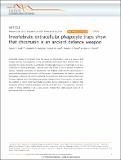Invertebrate extracellular phagocyte traps show that chromatin is an ancient defence weapon
Date
13/08/2014Metadata
Show full item recordAbstract
Controlled release of chromatin from the nuclei of inflammatory cells is a process that entraps and kills microorganisms in the extracellular environment. Now termed ETosis, it is important for innate immunity in vertebrates. Paradoxically, however, in mammals, it can also contribute to certain pathologies. Here we show that ETosis occurs in several invertebrate species, including, remarkably, an acoelomate. Our findings reveal that the phenomenon is primordial and predates the evolution of the coelom. In invertebrates, the released chromatin participates in defence not only by ensnaring microorganisms and externalizing antibacterial histones together with other haemocyte-derived defence factors, but crucially, also provides the scaffold on which intact haemocytes assemble during encapsulation; a response that sequesters and kills potential pathogens infecting the body cavity. This insight into the early origin of ETosis identifies it as a very ancient process that helps explain some of its detrimental effects in mammals.
Citation
Robb , C , Dyrynda , E , Gray , R , Rossi , A & Smith , V J 2014 , ' Invertebrate extracellular phagocyte traps show that chromatin is an ancient defence weapon ' , Nature Communications , vol. 5 , 4627 . https://doi.org/10.1038/ncomms5627
Publication
Nature Communications
Status
Peer reviewed
ISSN
2041-1723Type
Journal article
Description
Authors thankthe School of Life Sciences (HWU) for the Principal’s Sports Award and a PhD Scholarship to CTR. RDG is funded by a Wellcome Trust fellowship (WT093767). We acknowledge funding from the Medical Research Council, UK (G0601481 and MR/K013386/1) for A.G.R.Collections
Items in the St Andrews Research Repository are protected by copyright, with all rights reserved, unless otherwise indicated.

